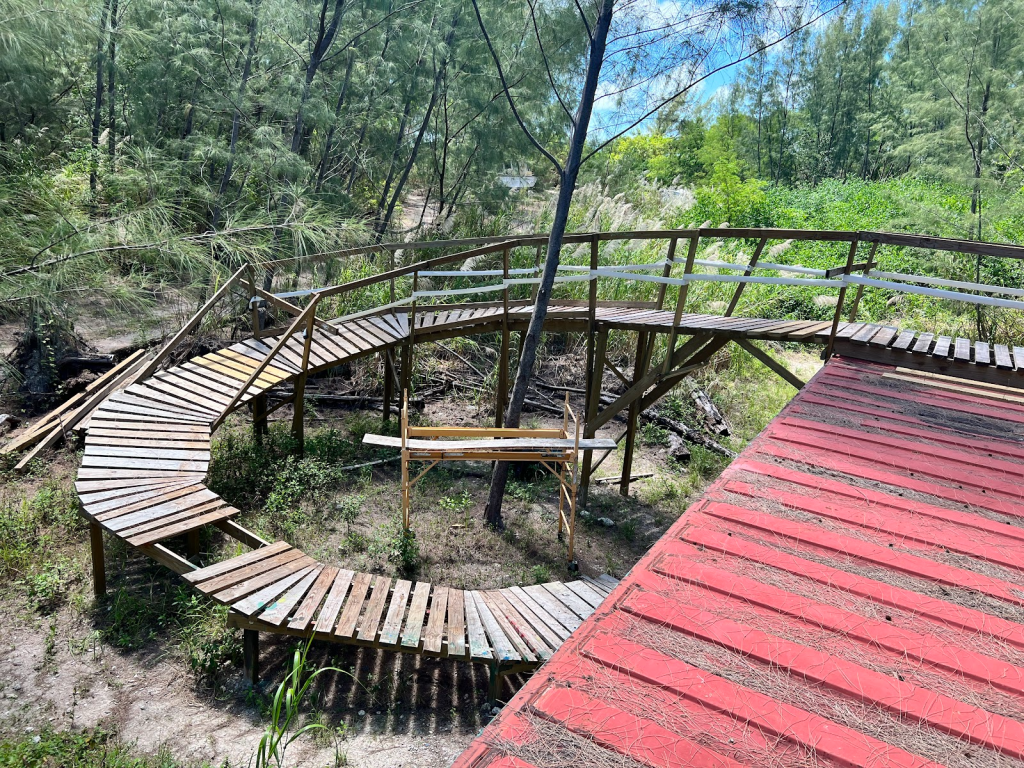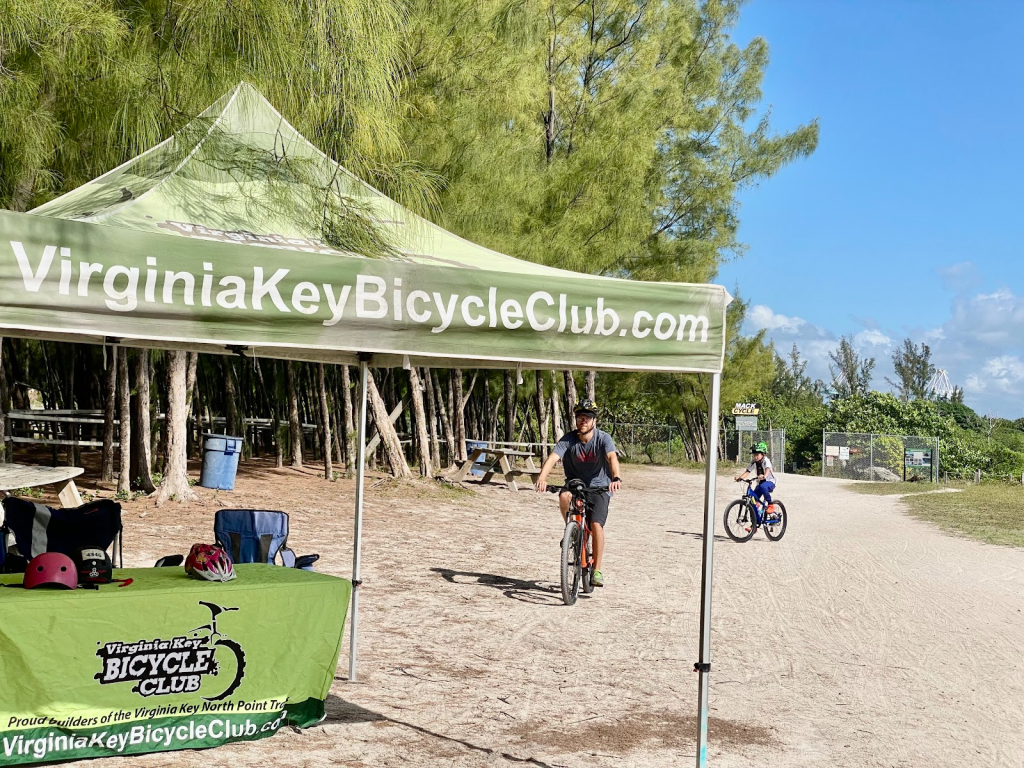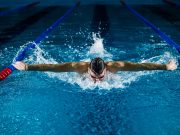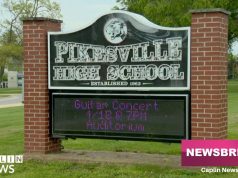Almost two decades ago, some innovative Miami mountain bikers had a crazy idea: Why not turn a dumping ground on the way to Key Biscayne into a place to ride.
In 2005, the Virginia Key Bicycle Club set out to transform 50 acres at the island’s north end into a park including 9.5 miles of bumps, drops and jumps available to the public.
“Over 40,000 hours of volunteer time in 12 years built the park for free for the City of Miami,” said John Voss, VKBC treasurer.
Virginia Key. located on the Rickenbacker Causeway, has a rich history that includes serving as Miami’s first black-only beach and being used as a dumpsite for over 50 years. But now scores of athletes traverse a labyrinth of mountain biking trails with a stunning view of the Miami skyline.
“I think you’d be challenged to find any major city in the United States, with nine miles of mountain biking trails, surrounded by water,” said Voss. ”It just doesn’t exist.”
Since at least the 1970s, the key has been utilized as a waste site for dredged materials from the Port of Miami, which harmed its beaches. It has also long been home to a huge sewage treatment plant that fouls the air.
“If you go on a [ride] when you go up the first hill and look down on the ground, you kind of see what we were dealing with when we first came in,” said Voss. “A combination of beauty and poop.”
There have been many attempts to repurpose the land where the bike trails are located. Among these was one in 2004, when Miami-Dade residents voted to build a civil rights museum. About $20.5 million was set aside for the project, which still hasn’t broken ground.
In 2010, the City of Miami approved a Virginia Key master plan that set aside $45 million of taxpayer money for conservation and land cleanup; the trails became a part of that plan.
“Although there were various ideas turned in, the city commissioners granted us the ability to build a park,’” said Voss. “It didn’t cost them a dime.”
The decision was made after “Bicycling” magazine named Miami one of the worst three cities in the nation for the sport.
“That’s bad for tourism,” said Voss. “So the board of tourism actually woke up and we finally got permission to start.”
Voss as well as Mary Jane Mark and Bernard Riviere, also club members, had been lobbying since 2005 to create a cyclists’ oasis.
“It took us five years to get an answer from the city,” recalled Riviere, who prefers to be called Frenchy.
Riviere, 67, is the self-taught architect behind the creation of riding trails.
“I do love geography and physics,” he said, “and I’m doing both here because I play with the terrain.”

Before he began creating the bike facility at Virginia Key, Riviere built trails at Oleta River State Park in North Miami.
“Seventeen years I built those trails,” Riviere said, “from ’92 to 2010.”
In the ‘90’s, Oleta had about two to three miles of mountain biking trails that Riviere says he rode regularly. He eventually became friendly with park manager John Robinson, who authorized him to expand the project.
“So I started to build with him,” Riviere said “Then my group of friends grew and people helped, and 17 years later, we had 14 miles of trails.” The group called itself ORAA (Oleta River Adventure Association).
In fall of 2010 the city granted the bikers permission to build and ride trails at Virginia Key.
“I started the first work day here a day before my birthday… September 18, 2010,” Riviere said. “Then the second week we started to have more people coming.”
As the number of people interested in the project grew, the group realized they needed more tools such as machetes and shovels. So they decided to officially form a club and collect $20 in membership dues to pay for supplies.
“We met at Sandbar Sports Grill in Coconut Grove,” Riviere recalled. “There were 20 people there, so we got 400 bucks.”
The club relies completely on donations, volunteer work, and sponsorship. The trails are built according to International Mountain Biker Association (IMBA) code and receive regular maintenance.
“People like Frenchy and myself are pushing 30 years of volunteering for the benefit of Miami Dade County for bicycles,” said Voss. ”But more credit needs to be given to Riviere because he’s actually the mad scientist that looks at it and knows what to do.”
Riviere and the volunteers utilize recycled pipes, hoses, donated paint, shipping containers and more.
“We got solar panels, we got the fire hoses,” Riviere said, gesturing to an impressive collection of supplies.“I got some [hose] from Hialeah and some from the City of Miami…they don’t have to go to the dump and fill up the landfill. We’re gonna reuse them!”
One VKBC member salvaged wood from Miami’s Tobacco Road bar as it was being shut down. The volunteers used it to repair the park after Hurricane Irma in 2017.
“So that hurricane wasn’t too bad, right?” Voss said. “It was like 35 to 50 miles an hour, except right here! Here they had a wind station. I remember I was home, hunkered down and it was all 35-50. Then Virginia Key had like 98 miles an hour!”
But volunteers came out almost as soon as the wind stopped and began removing fallen trees and branches.
“Imagine volunteering to pull wood in August with no shade!” Voss expressed. ”That’s how much our people love this park. My dumb thing is we liked this park so much, we built it twice.”
The rainy humid weather causes rot, and upkeep is necessary. And the trails are located next to a sewage plant, which Riviere and Voss believe is a good thing in disguise.
“Do you know what that smell is? That’s the smell of freedom,” said Voss looking at the trails. “Because without that this would be I don’t know what it would be.”
In fact, the club members say the distinctive smell is an essential part of the five-acres’ identity. If the park hadn’t been preserved, it could have easily been transformed into a commercial development.
The expansion has also provided a sanctuary for turtles, making it a conservation area where they can nest undisturbed.
“This beach is not for people,” said Jerri Halgowhich, a board member of VKBC. “It’s a turtle beach for them to come and nest.”
With more than 100 members, the Virginia Key Bicycle club has become an integral part of the community, and they intend to enhance their biking haven by building a new trail to celebrate their 13th year anniversary.
“We have a new trail that we’re working on that hopefully we’re gonna have ready for our anniversary” said Halgowhich. “It’s normally in March but because of the pandemic, it’s going to be in mid May.”

To get more information about the VKBC visit their website and to volunteer, visit their Facebook page for any upcoming events.


































